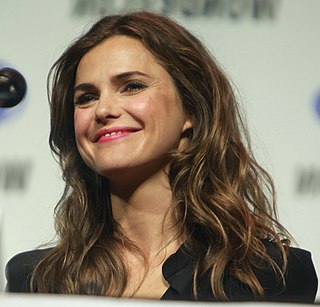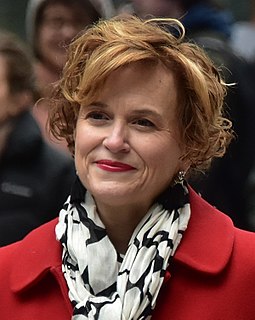A Quote by Blanche Wiesen Cook
But it's also the beginning of another level of liberation for her]Eleanor Roosevelt], because when she returns to New York, she gets very involved in a new level of politics. She meets Esther Lape and Elizabeth Read, and becomes very involved in the women's movement, and then in the peace movement. And ironically, the years of her greatest despair become also the years of her great liberation.
Related Quotes
Of course at that time, especially here in America, we were dealing with women's liberation. Things weren't so easy then. Méret Oppenheim wasn't so directly involved in this - she was in her 60s at that point. She found her strength through competing with the great male artists of her time; Max Ernst and Marcel Duchamp.
And she [Eleanor Roosevelt]loves being a star. And she loves being a teacher and a leader and a mentor and a big friend. Also, she's tall. She's one of the tallest girls in the school. And she's an athlete. And she writes many years later, at the end of her life, she writes that the happiest day, the happiest single day of her life was the day that she made the first team at field hockey. And I have to say, as a biographer, that's the most important fact. I
She sat leaning back in her chair, looking ahead, knowing that he was as aware of her as she was of him. She found pleasure in the special self-consciousness it gave her. When she crossed her legs, when she leaned on her arm against the window sill, when she brushed her hair off her forehead - every movement of her body was underscored by a feeling the unadmitted words for which were: Is he seeing it?
Well, when Eleanor Roosevelt's mother dies, she goes to live with her Grandmother Hall. And her Grandmother Hall is in mourning. She's in widow's weeds. She's in her 50s, but appears very old. And she's exhausted from raising rather out-of-control children. Her favorite daughter, Anna, has died (Eleanor's mother), and she has living at home two other sons, Vallie and Eddie. And they are incredible sportsmen, incredible drinkers, out-of-control alcoholics.
But she did not take her eyes from the wheels of the second car. And exactly at the moment when the midpoint between the wheels drew level with her, she threw away the red bag, and drawing her head back into her shoulders, fell on her hands under the car, and with a light movement, as though she would rise immediately, dropped on her knees. And at the instant she was terror-stricken at what she was doing. 'Where am I? What am I doing? What for?' She tried to get up, to throw herself back; but something huge and merciless struck her on the head and dragged her down on her back.
In one way, it is this sense of order and also love that, I think, really saved Eleanor Roosevelt's life. And in her own writing, she's very warm about her grandmother, even though, if you look at contemporary accounts, they're accounts of horror at the Dickensian scene that Tivoli represents: bleak and drear and dark and unhappy. But Eleanor Roosevelt in her own writings is not very unhappy about Tivoli.
I've known Carolyn [Maloney] for years, by the way. I knew her when she was on the City Council and knew her when she was - when she was running, and we endorsed her very early when she ran for Congress, yet I didn't know some of the stories in here of herself and her struggle, and - and she makes a very - you know, it's - it pulls your heart as well as - but it's very practical.
What's not fascinating about 'Wonder Woman?' She's powerful. She's strong. She gets her strength from other women. She kicks butt in the world. You know, she's bulletproof, which is appealing. But she also has the Lasso of Truth. That's the thing I would want most, that Lasso of Truth. Because in politics, it would be very handy.
For thousands of years what men has done to women is simply monstrous. She cannot think of herself as equal as man. & she has been conditioned so deeply that even if u say she is equal, she is not going to believe it. It has become almost her mind, the conditioning has become her mind, that she is less in everithing. & the man who has reduced the women to such a state also cannot love her. LOVE CAN EXIST ONLY IN EQUALITY, IN FRIENDSHIP
I think that, very often there's a pain that's just too painful to touch. You'll break apart. And I think her mother's death and disappearance and abandonment was something she just never could deal with. Eleanor Roosevelt, when she's really very unwell in 1936, she takes to her bed. She has a mysterious flu.
Eleanor Roosevelt's very helpful to a lot of children who cannot speak French, who do not write well. And Marie Souvestre is fierce. She tears up students' papers that are not, you know, perfect. And Eleanor Roosevelt goes around, again, being incredibly helpful to children in need, children in trouble. And her best friends are the naughtiest girls who are in trouble. And she is a leader. And she is encouraged to be a leader. And everybody falls in love with her. She's a star.




























